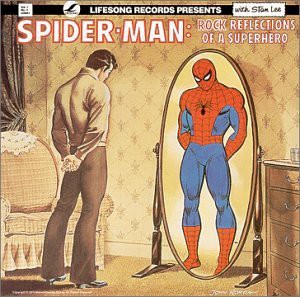 I flipped through one 40-year-old comic book the other day and was suddenly reminded of books I’d read and music I’d listened to way back then.
I flipped through one 40-year-old comic book the other day and was suddenly reminded of books I’d read and music I’d listened to way back then.
My time trip happened when I rummaged through the small collection of comic books from my youth to find the handful of “Guardians of the Galaxy” books I’d read in 1975. I was curious to see how they compared with the film. They didn’t. Not at all.
I did find something more interesting: reminders of other books I’d read, as well as the “lost” Spider-Man rock opera that really should have been the basis of a Broadway show, not that overwrought thing put together by Julie Tamor, Bono and The Edge.
I turned pages of bright four-color ink on yellowed newsprint. No. 3 in the series officially titled “Marvel Presents.” (The Guardians lasted about six issues in this run. They were never the heavy hitters of the Marvel Universe. Even Howard the Duck did better back then.)
First I came to an ad for the trade paperback “Son of Origins of Marvel Comics.” This was a follow-up to “Origins of Marvel” by Marvel editor-in-chief-of-everything-(still) Stan Lee. I’d devoured both books. I’d started reading Marvel Comics in 1972 or 1973, and felt most definitely late to a party that began in 1961 with “The Fantastic Four.” Stan’s books included anecdotes on how the first Marvel heroes were created, their origin story and another issue from Marvel’s great age of superhero creation. Reading the books then made me feel like I was inside the club rather than a late arrival. They’re still on my book shelf.
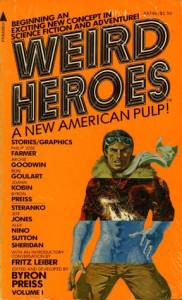 Below the ad for “Son of Origins” was one for “The Mighty Marvel Bicentennial Calendar,” with Spider-Man, The Hulk and Captain America trooping with drum, fife and flag. This I did not buy. Here’s what I missed out on: “A glorious, full-color, 12-month trek through American history with the Marvel superheroes. Join The Hulk at Valley Force. Conan the Barbarian at the Battle of Lexington…” You get the point.
Below the ad for “Son of Origins” was one for “The Mighty Marvel Bicentennial Calendar,” with Spider-Man, The Hulk and Captain America trooping with drum, fife and flag. This I did not buy. Here’s what I missed out on: “A glorious, full-color, 12-month trek through American history with the Marvel superheroes. Join The Hulk at Valley Force. Conan the Barbarian at the Battle of Lexington…” You get the point.
Near the back of the comic book was, as always, “Stan Lee’s Soapbox,” a must-read for teases on upcoming titles, crossovers and key collectible editions like “Giant Size Man-Thing” (that is, the comic book was giant size). In the column, Stan tub thumps for two Marvel writers, Archie Goodwin and Steve Englehart, who had contributed stories to a paperback anthology Weird Heroes. This really sent memory spinning. I don’t remember reading about Weird Heroes in Stan’s column. I’d discovered the first of the series in Book & Record in hometown Wappinger, N.Y. The cover, seen here, leapt off the shelf at me. In the books, editor Byron Preiss set out to create new American pulp heroes. What were the old American pulp heroes, you might ask? These crime fighters came before comic books or radio and were featured in magazines and books published on cheap pulpy newsprint. They included The Shadow, Doc Savage and The Avenger (pre-dating the Avengers of Marvel or British TV fame). Also the Bat, said to have been an inspiration for a certain Bat Dude. The Spider, said to have been an inspiration… Well you get the point.
Some of the new pulp heroes included Adam Stalker, Guts the Cosmic Greaser and Gypsy. Preiss put out eight volumes, though a renaissance of American pulp heroes never did happen (unless you count three-quarters of Hollywood’s output).
The highlight of this tour through my adolescent media consumption via one little comic was the full-page ad at the back for the record album, “Reflections of a Rock Super-Hero.” The banner at the top called it the “The Biggest Rock Event of the Year.” Don’t know about that, but the LP told Spidey’s tale better than the now defunct Broadway musical. Songs included “No One Has a Crush on Peter,” “Gwendolyn” and “A Soldier Starts to Bleed,” with narration between the tracks by Stan the Man himself. This I also still own a copy of.
One comic book pulled out because of a movie I saw in August, and I stumbled across all kinds of memories. It’s funny where the past finds you.
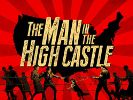
 I flipped through one 40-year-old comic book the other day and was suddenly reminded of books I’d read and music I’d listened to way back then.
I flipped through one 40-year-old comic book the other day and was suddenly reminded of books I’d read and music I’d listened to way back then. Below the ad for “Son of Origins” was one for “The Mighty Marvel Bicentennial Calendar,” with Spider-Man, The Hulk and Captain America trooping with drum, fife and flag. This I did not buy. Here’s what I missed out on: “A glorious, full-color, 12-month trek through American history with the Marvel superheroes. Join The Hulk at Valley Force. Conan the Barbarian at the Battle of Lexington…” You get the point.
Below the ad for “Son of Origins” was one for “The Mighty Marvel Bicentennial Calendar,” with Spider-Man, The Hulk and Captain America trooping with drum, fife and flag. This I did not buy. Here’s what I missed out on: “A glorious, full-color, 12-month trek through American history with the Marvel superheroes. Join The Hulk at Valley Force. Conan the Barbarian at the Battle of Lexington…” You get the point.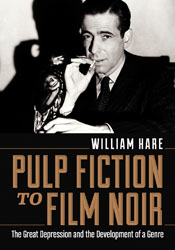 I first discovered McFarland & Co. Publishers many years ago when I bought the book Unsold Television Pilots 1955-1988 by
I first discovered McFarland & Co. Publishers many years ago when I bought the book Unsold Television Pilots 1955-1988 by 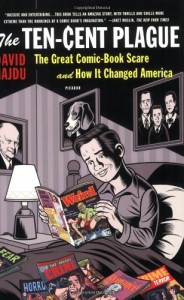 This year’s focus is on comic books and graphic novels, which get attacked just like “serious” books, whether the Captain Underpants series or the brilliant Persepolis. I’ve read comic books since I was a kid and still love them. I take it as a perverse complement that the book banners and burners are coming after one of my favorite kinds of literature. If you want to read a great book on how much damage such hysteria can do, read
This year’s focus is on comic books and graphic novels, which get attacked just like “serious” books, whether the Captain Underpants series or the brilliant Persepolis. I’ve read comic books since I was a kid and still love them. I take it as a perverse complement that the book banners and burners are coming after one of my favorite kinds of literature. If you want to read a great book on how much damage such hysteria can do, read